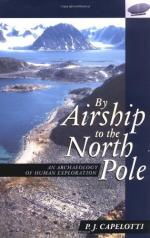|
This section contains 1,688 words (approx. 6 pages at 300 words per page) |

|
Overview
During the first part of the twentieth century, having mapped and visited nearly the whole Earth, explorers turned their attentions to the Poles. Inhospitable, dangerous, and difficult to reach, the North and South Poles represented one of the ultimate adventures left on Earth and their conquest captured the public attention. When Roald Amundsen (1872-1928) reached the South Pole in 1911, one phase of the exploration of the Earth ended and another began.
Background
From time immemorial, mankind knew of the frozen wastes to the north. The Norse, Siberians, Inuit, and others lived in it and even merchant sailors came across icebergs broken loose from the northern ice packs. Eventually, as people came to understand that the Earth was a sphere spinning in space, they realized that the Earth's axis of rotation would be found in the far north and the...
|
This section contains 1,688 words (approx. 6 pages at 300 words per page) |

|


